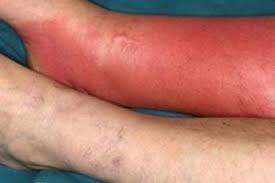About Cellulitis
What is cellulitis?
Cellulitis is a deep skin infection, caused by bacteria. It mostly affects the legs and arms, but can also be found in the eyes, mouth and other areas.
Usually, cellulitis is a result of a type of injury which causes a skin break, including trauma or surgery.
However, it can also be due to poor circulation or a weak immune system. As well as being caused by conditions such as Lymphoedema.
Symptoms
Symptoms of cellulitis can include:
- Pain or tenderness in the affected area
- Sudden skin sore or rash that appears quickly
- Tight, stretched and glossy skin
- Redness and inflammation
- itching
There are also symptoms that are not seen or found in the skin. Such as nausea and vomiting and muscle ache and fatigue.
Treatment
The NHS suggest that for mild cellulitis affecting a small area of skin, a doctor will prescribe antibiotic tablets, usually for a week. Symptoms may worsen for 48hours after taking antibiotics, but then begin to improve. It is important to contact your GP if symptoms do not improve.
The NHS also suggest you keep taking your antibiotics until they're finished, even if you feel better. Most cases should improve in 7-10 days. For more NHS information, click here.
In severe cases, you might be referred to hospital for treatment.
Some people with recurring cellulitis might be prescribed low-dose long-term antibiotics to stop infections coming back.
Things you can do to manage cellulitis
- Raising the affected body part (try a pillow or a chair), when sitting or laying. This can help reduce swelling.
- Movement of the joint near the affected area (such as wrist or ankle), to prevent stiffness.
- Drinking plenty of fluids to prevent dehydration.
- Wearing compression hosiery.
- You can also take paracetamol and ibuprofen for the pain (only if your GP recommends).

Reducing the chances of cellulitis
Here are some ways to reduce the chances of reinfection. If possible you can:
- Keep skin moisturised and clean.
- Use antiseptic cream to clean any cuts or wounds.
- Wear appropriate clothing and footwear to prevent cuts and scrapes.
- If working outside, wear gloves.
More information.
To view the NHS information and recommendations, click here.
This contains further recommendations and advice on any complications. As well as contact numbers.